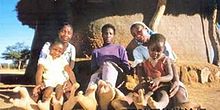Vadoma
| Regions with significant populations | |
|---|---|
| Zimbabwe | |
| 16,000?[1] | |
| Languages | |
| Dema, Korekore Shona, Kunda | |
| Religion | |
| Seventh-Day Adventist, African Traditional Religion | |
| Related ethnic groups | |
| Khoisan, Shona | |
The Doma or vaDoma (singular muDoma), also known as Dema, are a tribe living in the Kanyemba region in the north of Zimbabwe, especially in the Urungwe and Sipolilo districts around the basins of Mwazamutanda River, a tributary of the Zambezi River Valley. They are the only traditional hunter-gatherers indigenous to Zimbabwe and famous for the inherited ectrodactyly existing among some vaDoma families.
Language[edit]
The vaDoma speak the Dema language, closely related to the dominant Shona language of Zimbabwe and highly comprehensible to Korekore and Tande Shona dialects.[2] Living alongside Shona and Kunda people in Kanyemba, they also speak Korekore Shona and Kunda.
History[edit]
According to vaDoma mythology, their ancestors emerged from a baobab tree. Upon descending from it, they walked upright to hunt and gather the fruits of the land.[3] The name vaDoma is also used in the Zambezi region for a semi-mythical people characterized as magical, capricious, hard to find, and living among the trees. This may refer to Khoisan hunter-gatherers who preceded the migration of the Bantu Shona into the Zambezi Valley, and the vaDoma are possibly related to this earlier population.[4] Rumors also persist among nearby peoples that the vaDoma are capable of disappearing in the forest and performing magic.
Historically, the vaDoma chiefly dwelt in the mountains, living a largely nomadic lifestyle of hunting, fishing, trapping, honey hunting, and gathering wild fruits and roots.[5] Prior to the European colonization of Africa, the vaDoma also resisted incorporation into the Korekore Shona kingdom of Mutapa,[2] which resulted in little access to fertile land.[6] Land reform after Zimbabwe's independence did not change this, despite pressure from the Mugabe government, and the vaDoma's continuing dispossession has made them Zimbabwe's only non-agricultural society, leading to stereotypes as "Stone Age cave-dwellers".[7][better source needed]
The mountain homeland of the vaDoma has now become the Chewore Safari Area.[8] In recent years, vaDoma have been threatened by game rangers due to a crackdown on poaching. Many abandoned their hunter-gatherer lifestyle and moved to the lowlands. Today, though they have little contact with the majority populace, many vaDoma families live settled lives as semi-foragers, building houses on wooden platforms to avoid predators. During rainfall, they cover the shelters with thatching. vaDoma are also reluctant to wear textile fabrics.[6][9] Recently, the Seventh-Day Adventist Church built Mariga Primary School to educate vaDoma children.[3]
Ectrodactyly[edit]

A substantial minority of vaDoma has a condition known as ectrodactyly in which the middle three toes are absent and the two outer ones are turned in, resulting in the tribe being known as the "two-toed" or "ostrich-footed" tribe. This is an autosomal dominant condition resulting from a single mutation on chromosome number 7.[10] It is reported that those with the condition are not handicapped and are well integrated into the tribe. While possibly an aid in tree climbing, the condition prevails because of a small genetic pool among the vaDoma and is propagated by the tribal law that forbids members to marry outside the group.[10]
Due to the vaDoma tribe's isolation, they have developed and maintained ectrodactyly, and their comparatively small gene pool has resulted in the condition being much more frequent than elsewhere.[10] The Eastern Shona Kalanga of the Kalahari Desert also have a number of members with ectrodactyly and may be related.[10]
References[edit]
- ^ Project, Joshua. "Doma, Vadoma in Zimbabwe".
- ^ a b Lan, David (1985-01-01). Guns & Rain: Guerrillas & Spirit Mediums in Zimbabwe. University of California Press. ISBN 9780520055896.
- ^ a b "Relief for the Doma people". NewsDay Zimbabwe. Retrieved 2016-03-31.
- ^ Lancaster, C.S.; Pohorilenko, A. (1977-01-01). "Ingombe Ilede and the Zimbabwe Culture". The International Journal of African Historical Studies. 10 (1): 1–30. doi:10.2307/216889. JSTOR 216889.
- ^ "Global Prayer Digest - vaDoma". www.globalprayerdigest.org. Retrieved 2016-03-31.
- ^ a b Bruijn, Mirjam De; Dijk, Rijk A. van; Foeken, Dick (2001-01-01). Mobile Africa: Changing Patterns of Movement in Africa and Beyond. BRILL. ISBN 9004120726.
- ^ Swaney, Deanna (1999-01-01). Zimbabwe, Botswana & Namibia. Lonely Planet. ISBN 9780864425454.
- ^ "Is there hope for the Dema people? - Zimbabwe - OM News". news.om.org. Retrieved 2016-03-31.
- ^ "The Ostrich People of Kanyemba - An Extraordinary Tribe - Shearwater Victoria Falls". Shearwater Victoria Falls. Retrieved 2016-03-31.
- ^ a b c d Farrell HB (1984). "The two-toed Wadoma--familial ectrodactyly in Zimbabwe". S. Afr. Med. J. 65 (13): 531–3. PMID 6710256.
